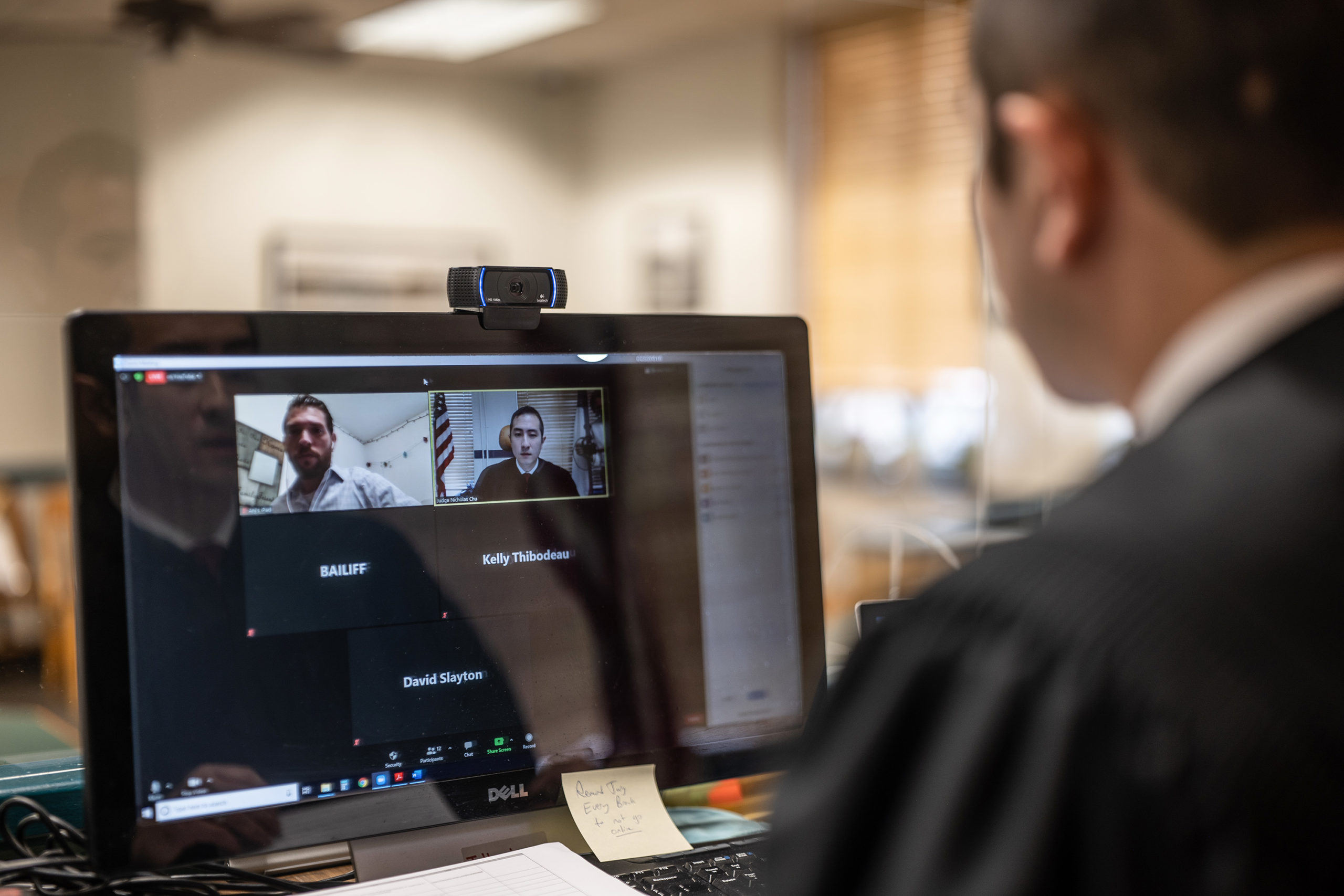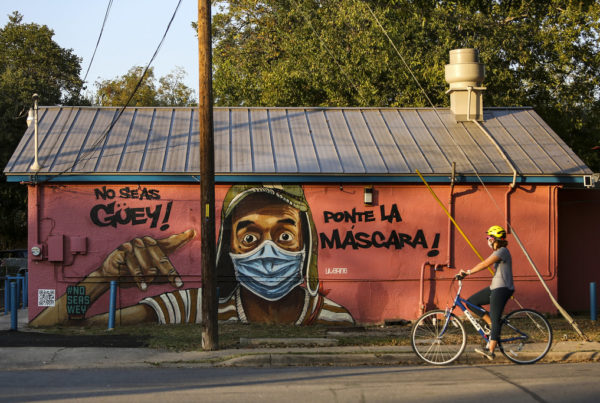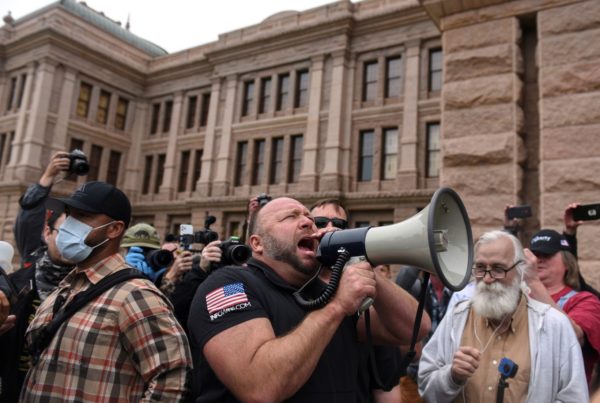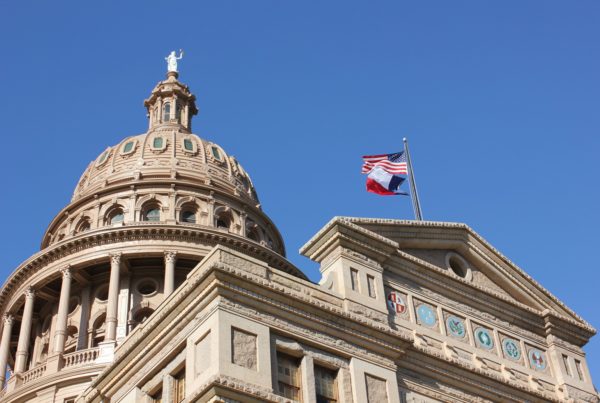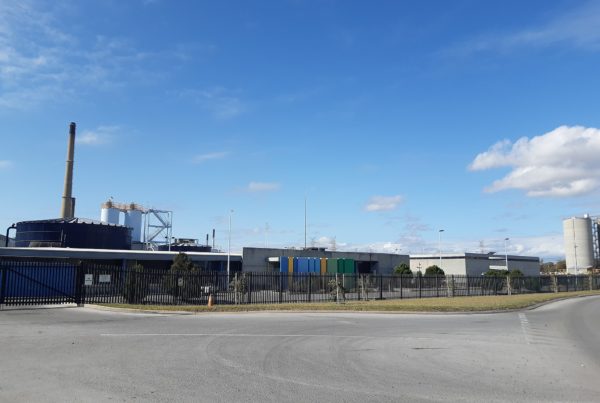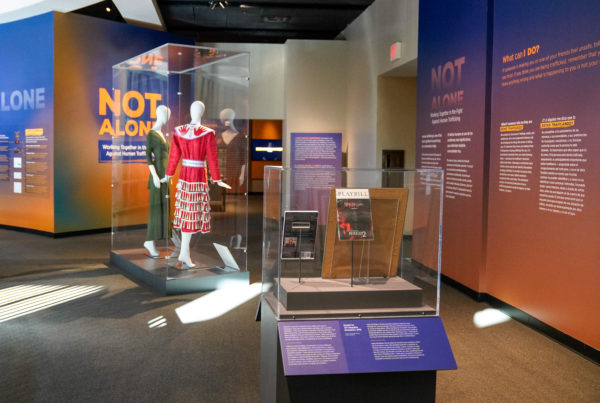A weekslong trial for car burglary is far from typical, but these were abnormal times — as evidenced by the blue X’s taped onto half of the jury box chairs, and bottles of hand sanitizer and Clorox wipes scattered throughout the courtroom.
Pratt, 46 and homeless, had been in the Brazos County jail for more than a year and a half, suspected of stealing from two trucks after numerous burglary convictions. His trial, originally slated for March 16, was delayed for months as the deadly coronavirus swept through the state and prompted the closures of restaurants, stores and, notably, courts.
In 2019, about 186 Texas jury trials were held in civil and criminal cases in an average week, according to the state Office of Court Administration. From March until June of 2020, that number went to zero. The backlog of cases, which has continued to grow, will likely take the state years to overcome.
“The court system in Texas has responded really well in everything except jury trials,” David Slayton, administrative director of the state’s court administration office, said in September. “It’s not really possible or feasible to have a lot of people in a room.”
Last summer, several counties began experimenting with ways to hold in-person jury trials under the supervision of the state. Among those counties was Brazos, which scheduled two in-person criminal jury trials for defendants who had long been incarcerated. In mid-August, jail employees drove Pratt and another man about a mile and a half to the courthouse to stand trial.
At first, everything went as planned.
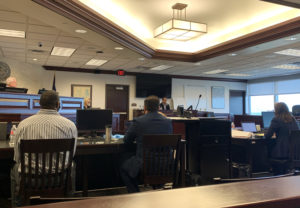
Teron Pratt, left, and his defense attorney, Corey Cagle, listen to witness testimony in September 2020. Pratt’s trial was delayed by a month after he was taken from the jail to court in August despite being infected with the coronavirus.
The jurors had been chosen earlier from a group of about 50 in a nearly 8,000-square-foot room at the county’s convention center. Those who said they weren’t comfortable being in court because of the pandemic had been dismissed.
In the courtroom, the jurors were spaced out in the jury box and the gallery, where the public usually sits, each donning either a mask or clear face shield. Pratt, his attorney and the prosecutors also wore masks, and witnesses were given the option to keep their masks on or take them off when testifying. The bailiff wiped down the witness stand between people and replaced the small plastic cover that fit snug over the microphone.
The trial’s first phase required the jury to decide whether Pratt was guilty. Arguments in that phase were over in less than a day, and the jurors went home for the night still mulling their decision. Then state District Judge Steve Smith received a call from an employee’s husband, who worked for the sheriff’s office.
Pratt was infected with the coronavirus, having tested positive the previous week.
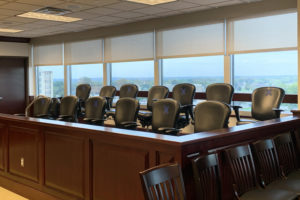
Blue X’s marked half of the seats in the Brazos County courtroom during Teron Pratt’s trial.
The defendant had been unaware of his test result, but Brazos County jail officials knew. Pratt should never have been allowed to leave an isolated cell, let alone been taken to the courthouse in a county vehicle while seated next to another defendant who then sat in another courtroom all day. The sheriff blamed a lack of communication between detention and transport staff, a problem he later said was remedied with better signage in isolation wards and updated lists of inmates who’ve tested positive.
The next morning, Smith let the jury finish deliberating while Pratt stayed in isolation at the jail. When jurors reached a verdict, Smith told them they’d all potentially been exposed to the coronavirus and the case would be recessed for at least two weeks while everyone went into quarantine.
The jury wasn’t allowed to announce if it found Pratt guilty or innocent because the defendant wasn’t present.
In the courtroom next door, where the trial for Pratt’s earlier car companion, Charles Raines, was still ongoing, the judge declared a mistrial after telling the jurors they had been potentially exposed to the virus. Raines tested positive for the coronavirus soon after.
“I’d be hard pressed to say that it went well, considering I had to self-quarantine for two weeks mid-trial,” Corey Cagle, Pratt’s defense attorney, said about the trial when it finally resumed a month later, in September.
A Trial Run
Pratt’s and Raines’ trials were part of a test run. After the pandemic shut down much of the state in March, many Texas court proceedings moved to the virtual realm. Judges are required to hold hearings remotely as much as possible, leading them and the parties involved to regularly appear on video screens or on the phone to handle plea bargains and arraignments.
But jury trials, seeking fair judgment from a dozen citizens representative of the community, are more complex, especially in criminal cases when a person’s liberty is on the line.
After months without a single jury trial in Texas, the state Supreme Court decided in late May to experiment with restarting the crucial component of the justice system. It ruled that local judges could hold a limited number of jury trials again. But it required prior approval from administrative judges and the state’s court administration office, which would assess safety measures and local outbreaks of the virus.
From June through September, a total of 25 criminal jury trials — ranging from traffic violations to murder cases — were fully conducted under this supervision, the court administration office reported. That’s less than one-fifth of the Texas criminal cases tried by a jury in an average week in 2019. Experiments included a low-stakes Austin trial held over a Zoom videoconference and Houston residents being summoned to the city’s major sports arena for jury selection.
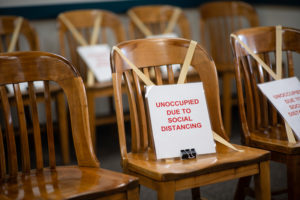
Seats in a Travis County courthouse are taped off to keep distance during proceedings.
Judges in rural areas like Scurry County and in the state’s largest urban center of Harris County pushed forward with the already tremendous backlog of criminal cases on their dockets. But, as highlighted in Brazos County, there were hiccups.
“Most of them have gone according to plan and fairly smoothly, but that is not the case in all of these trials,” said Slayton, the state court administration official. “The courts can do everything right, but … everyone has to do their part or else things can go wrong.”
Like in Brazos County, a handful of other cases throughout the state were complicated by jurors and key witnesses testing positive for the coronavirus just before or during trial, prompting judges to call for long pauses in the proceedings or declare mistrials.
Still, the state viewed the trial run as an overall success. In October, the Texas Supreme Court allowed in-person jury trials to proceed with less supervision in district and county courts, during which there were another 22 criminal jury trials, Slayton said. November data was not yet available in December, but he expected the count to have decreased significantly because of holidays and the recent surge in coronavirus cases.
Last month, a defense attorney thought to have contracted the coronavirus from his jailed client at a November pretrial hearing died, according to Texas Lawyer. The hearing involved discussions on safety precautions needed to go forward with a jury trial in the case.
Almost all of the 88 counties preapproved to hold jury trials had suspended them because of the rise in infections, Slayton said. With the new suspension and the relatively minuscule number of trials held since the pandemic began, the backlog of civil and criminal jury trials in the state is expected to surpass 10,000 in April.
Numerous scheduled trials were also further delayed as, along with public health risks, attorneys and judges debated the rights of both defendants and crime victims. Concerns over delays to justice, keeping presumably innocent people waiting in infected jails, and the fairness of pandemic-adapted trials raised questions on whether and how trials should be conducted.
For example, disproportionately white juries were already a problem before the pandemic. With the coronavirus disproportionally harming Black and Hispanic communities, many defense attorneys fear fewer people of color will show up to a jury summons, as at least one Texas study has already predicted. And masked jurors and attorneys shield one another not only from germs but also from facial expressions, often crucial in trials.
“There have been trials around the country where there have been COVID issues, but that’s only half of the equation. That’s the public safety part of the problem,” Grant Scheiner, president of the Texas Criminal Defense Lawyers Association, said last fall. “Nobody seems to be paying attention to the constitutional aspect.”
But as more cases fill stagnant court dockets, defendants wait in jail and victims hope for resolution, judges and attorneys are seeking ways to move forward.
“It’s awfully easy for lawyers in ivory towers to say we need to wait; it’s not easy for my guy sitting in jail,” said Carl Guthrie, an Austin defense attorney who represented the defendant in a first-of-its-kind Zoom jury trial in a criminal traffic case.
The 2020 Jury Trial
Like much of the world, the court system has tried to adapt to a remote work environment.
Slayton said Texas judges have conducted more than a dozen virtual jury trials, with jurors logging on from home computers or state-provided iPads. But these Zoom trials are largely targeted for civil or low-level criminal cases that can’t result in jail time and involve no victims, like traffic offenses. For any criminal case that could result in more than a fine, courts have been wary to hold virtual trials.
“We have worries for much more complicated cases where someone’s liberty is at stake or there are victims’ rights to consider,” said Jaime Flores, the prosecutor in the Travis County traffic case believed to be the nation’s first virtual criminal trial.
For those types of cases, in-person proceedings mean major adjustments to follow pandemic safety protocols. With health experts’ recommendation to keep at least 6 feet away from others, most courthouses are not big enough for jury selection anymore, where often more than 50 people are brought together to select a jury of 12. While Pratt’s jury was selected at a convention center, people across the state were summoned to local gymnasiums, theaters and ballrooms, according to a court administration office report.
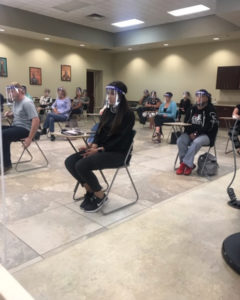
Potter County held jury selection in an Embassy Suites ballroom next to the courthouse.
Defense attorneys are wary about the selection process in these distanced settings. Generally in jury selection, citizens are grouped close together in a courtroom as lawyers for both parties question them about topics that may lead a person to be biased or conflicted in the case. Reading jurors’ faces to gauge their biases is harder when everyone is wearing a face mask and spread throughout a large ballroom.
“It’d be very easy to be talking to Juror 1 and 2, and co-counsel to be watching all the other jurors and see what their reaction is: Are they rolling their eyes, are they screwing up their face?” said Pratt’s attorney, Cagle, noting it was hard to do that in the Brazos Center.
Even more concerning, attorneys say, is that fewer people are showing up. The state report on trials through September said most courts saw about a 5% to 10% drop in people reporting for jury duty during the pandemic. A June survey by the Tillotson Law Firm of 650 potential jurors in Dallas and Houston showed a majority said they wouldn’t go to court if summoned without being ensured of adequate safety precautions. The number was higher for Black and Hispanic respondents.
“We know that African Americans, Latinos and other people of color have been disproportionately affected by COVID-19,” Scheiner said. “If they don’t show up for jury service in as great a percentage as they have in previous years, it may be impossible for minority defendants to have anything close to a jury of their peers.”
In Pratt’s Brazos County trial, one juror reported as Black, one was Asian, two were Hispanic, and the other eight were white — a makeup that skews more white than the county’s 55% of the population. Pratt is Black.
A Patchwork Of Approaches
Still, arguments to halt jury trials compete with desires to move the system forward and cut into the backlog of cases. Some in the courts are seeking other ways to make a dent without a rush of in-person trials.
In Dallas, for example, there have been no criminal jury trials, even though it is the state’s second-largest county. District Attorney John Creuzot said his office’s alternative solution so far has been to take a second look at every trial-ready case to see if there’s another way to resolve it — whether it be a bench trial before a judge or a more lenient plea agreement.
In late September, he directed his prosecutors to try to resolve 10 felony jail cases in each court without jury trials and still protect public safety, like potentially changing a 30-year recommended sentence to 25 years to get a plea agreement. More than 100 cases have since been resolved, he said.
“You’re going to get to a point where you lose witnesses, memories fade, so time is not the ally of the state,” he said.
Other counties, however, have sought numerous in-person jury trials. Between June and September, northeast Texas’ Bowie County carried out five criminal trials, including a capital murder case in August. Daveon Woods was found guilty of a home invasion-turned-murder, committed when he was 17, and sentenced to life in prison, the maximum sentence for someone under 18 convicted of capital murder.
And Pratt’s was the second criminal trial Smith conducted during the pandemic. Judge Kyle Hawthorne, who had declared a mistrial in Raines’ case, also tried another criminal case in September. And with each case, they were learning.
After Pratt’s trial, prosecutors asked the jury how the safety precautions might have affected their ability to assess the case.
“They were still able to tell our emotion, the tone we were trying to convey,” said Amanda Janssen with the Brazos County district attorney’s office. “We’re in a pandemic and it’s a very contagious disease and it’s very serious, but I think we can maintain this, I think, as long as we do maintain it and not become lax with our precautions.”
Delayed Chaos
When Pratt’s trial finally resumed in mid-September, more than four weeks after it was halted due to coronavirus exposure, things remained a mess.
The jail sent Pratt, now healthy, to court in his orange jail jumpsuit, though defendants who have not been found guilty are required to wear street clothes to not prejudice the jury. The wardrobe mishap prompted an eye roll and wisecrack from the judge, setting the tone for what was to come.
When the trial was set to resume, a somewhat-muted frenzy swept the room as one juror remained alarmingly absent. (The lone alternate juror, selected in case something like this happened, had been previously excused because that person was a doctor scheduled to be the sole medical provider in a nearby small town during the trial.)
Court officials scrambled to find updated contact information for the juror, who appeared to no longer work at the job he held when the trial began. Finally, about 45 minutes past when the trial was scheduled to resume, police officers were sent to juror’s house to escort him to the courthouse.
In the chaos, Smith and the attorneys nervously joked and laughed, quipping about raining frogs and citing an old “Saturday Night Live” bit. Pratt sat in the holding cell, waiting just outside the courtroom.
The juror called the judge moments after the police dispatch, breathlessly saying he was on his way.
“If it’s not one thing, it’s another,” the judge said, the “SNL” quote he would repeat throughout the day.
Once the jury was present, there was another delay as Cagle moved for a mistrial, like the one issued for Raines in August. The attorney argued that, given local news coverage, the jury likely knew Pratt was the one who exposed them to the coronavirus and had been in jail.
“He might as well still be dressed in orange,” he said.
The judge denied the motion, and the parties agreed he would tell the jurors that Pratt had not been aware he had contracted the coronavirus and they could not hold their potential exposure against him.
Finally, the trial was able to resume. Pratt was found guilty (the verdict the jury had reached a month earlier). The sentencing phase of the trial then was a fairly typical affair, with the exception that most people in the room were wearing face masks or shields.
The jury in Pratt’s trial broke to deliberate his punishment in the mid-afternoon, returning 45 minutes later to give Pratt the maximum sentence: 10 years in prison. His body remained still as his sentence was read, his face unreadable behind the mask.
But don’t expect Pratt’s case to be over. Defense attorneys have promised to heavily target jury representation, consent and limited interactions when appeals courts begin to scrutinize the recently handed-down convictions in the coming months and years.
Afterward, Cagle complained that Pratt hadn’t wanted to go to trial during the pandemic. He echoed other defense attorneys’ concerns about a rule change at the Texas Supreme Court. When the court first allowed the pilot program for jury trials, it specified that both prosecutors and defendants needed to consent to the trial in the pandemic. A month later, in late June, the requirement for consent was removed without comment.
“To me that was a huge, huge mistake,” Cagle said. “This was a human experiment, and had it been conducted in any other type of setting … there would have been required consent.”


